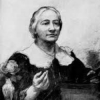Ellen Key

Ellen Key
Ellen Karolina Sofia Keywas a Swedish difference feminist writer on many subjects in the fields of family life, ethics and education and was an important figure in the Modern Breakthrough movement. She was an early advocate of a child-centered approach to education and parenting, and was also a suffragist...
NationalitySwedish
ProfessionWriter
Date of Birth11 December 1849
CountrySweden
curves emotions follow love movement phenomena receive science shall
When psychical phenomena have been as much investigated as physical, love will also receive its cumatology - that is, its science of waves. We shall follow the curves of the emotions through the ages, their movement of rise and fall, the oppositions and side-influences by which they have been determined.
beginning conception dogma esteemed formula immoral legal love marriage might moral opposed simplest women
The simplest formula for the new conception of morality, which is beginning to be opposed to the moral dogma still esteemed by all society, but especially by the women, might be summed up in these words: Love is moral even without legal marriage, but marriage is immoral without love.
cannot clearer consciousness facility love marriage modern recognized society
The ever clearer consciousness that love can dispense with marriage, yet marriage cannot dispense with love, is already partially recognized by modern society, by the facility of divorce.
cannot delicate eternal future hope life listen love mystery reason remain science secrets
Love, as life, will fortunately remain an eternal mystery which no science will be able to penetrate and which reason cannot rule. Our only hope for the future is that man, endowed with a more delicate sense, will listen to the secrets of his own life.
firm ground hate love peace save terror war
Just as little as terror - not even the terror of war - can save the world, just as little can hate ever be anything uplifting. Love is the only firm ground for peace - not only love for one's fellowmen, but first of all, love of one's country.
adds anyone great life love mysterious picturing plain poetry poor power says thousands tragic
For thousands of years, poetry has been picturing love as a mysterious and tragic power. But when anyone says the same thing in plain prose, and adds that life would be colourless and poor without the great passions, then this is called immorality!
burn fire great ideal letters love moral soul strength youth
To burn the ideal of a great love into the soul of youth in letters of fire - that is to give him a real moral strength.
both gifts gracious great life love
Great love, like great genius, can never be a duty: both are life's gracious gifts to its elect.
marriage ties secret-love
A great poet has seldom sung of lawfully wedded happiness, but of free and secret love; and in this respect, too the time is coming when there will no longer be one standard of morality for poetry and another for life. To anyone tender of conscience, the ties formed by a free connection are stronger than the legal ones.
growth humans human-love
Is human love the growth of the human will ?
love marriage moral
Love is moral even without legal marriage, but marriage is immoral without love.
generation however labour might monotonous obtaining older succeeded thankful wearing women work younger
While the women of the older generation were thankful if only they succeeded in obtaining 'a work and a duty,' however monotonous and wearing it might be, the will of the younger generation for a pleasurable labour has fortunately increased.
create endanger glory honour knows laws means patriotism power seeks strength whereas
Whereas nationalism still seeks power, honour, and glory through means that endanger other countries, patriotism knows that a country's strength and honour can only be permanently safeguarded through concourse with other countries. And whereas nationalism scoffs at the idea of international laws and regulations, patriotism seeks to create such.
attained break demands ethical formula impossible inner moral morality nature necessity needs outer physically society true unity void
When, in any ethical department, unity is attained between outer demands and inner desires, between nature and conscience, between the needs of society and the individual, the moral formula is void because inner necessity then makes it psychically and physically impossible to break the outer law. Thus, true morality is attained.